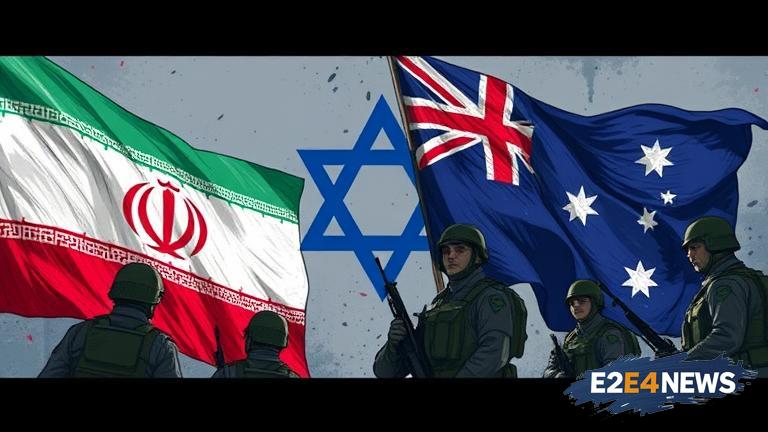In recent months, Australia has witnessed a disturbing rise in antisemitic attacks, with many incidents being linked to the Islamic Revolutionary Guard Corps (IRGC) of Iran. The IRGC, a powerful branch of Iran’s military, has been accused of promoting antisemitic ideologies and supporting extremist groups worldwide. The attacks in Australia have targeted Jewish communities, synagogues, and individuals, leaving many feeling vulnerable and frightened. The Australian government has condemned the attacks, emphasizing the need to protect the country’s Jewish population and prevent the spread of hate speech. Experts believe that the IRGC’s influence extends beyond Iran’s borders, with the group’s ideology being disseminated through social media and other online platforms. This has led to a growing concern over the global reach of extremist groups and the need for international cooperation to combat hate speech and terrorism. The IRGC’s antisemitic views are rooted in its ideological opposition to Israel and the Jewish people, with the group’s leaders frequently expressing hostile rhetoric towards the Jewish state. The attacks in Australia have been characterized by vandalism, harassment, and physical assaults, with many incidents being reported in major cities such as Sydney and Melbourne. The Jewish community in Australia has expressed outrage and concern over the attacks, calling for greater protection and support from the government. The Australian government has responded by increasing security measures at Jewish institutions and events, as well as launching investigations into the attacks. However, many believe that more needs to be done to address the root causes of antisemitism and to prevent the spread of extremist ideologies. The IRGC’s links to global extremism have been well-documented, with the group being accused of supporting terrorist organizations such as Hezbollah and Hamas. The group’s influence has also been linked to the rise of antisemitic movements in Europe and North America, highlighting the need for a coordinated international response to combat hate speech and terrorism. In Australia, the government has faced criticism for not doing enough to address the issue of antisemitism, with many calling for greater education and awareness programs to combat hate speech. The Jewish community has also expressed concerns over the rise of far-right extremism in Australia, which has been linked to antisemitic attacks and harassment. The IRGC’s ideology has been characterized as a toxic mix of antisemitism, anti-Western sentiment, and extremist Islamic ideology, which has been disseminated through various channels, including social media and online forums. The group’s leaders have frequently expressed hostile rhetoric towards the Jewish people, with many calling for the destruction of Israel and the elimination of Jews worldwide. The attacks in Australia have been widely condemned by community leaders, politicians, and human rights organizations, with many emphasizing the need to protect the country’s Jewish population and prevent the spread of hate speech. The Australian government has faced pressure to take stronger action against the IRGC and its affiliates, including imposing sanctions and designating the group as a terrorist organization. However, the government has been cautious in its approach, citing concerns over diplomatic relations with Iran and the need to balance national security with human rights. As the situation continues to unfold, many are left wondering what the future holds for Australia’s Jewish community and the global fight against antisemitism and extremism. The IRGC’s influence is likely to remain a major concern for governments and communities worldwide, highlighting the need for a coordinated and sustained effort to combat hate speech and terrorism. In conclusion, the rise of antisemitic attacks in Australia linked to the IRGC is a disturbing trend that requires immediate attention and action from governments, communities, and individuals worldwide.
